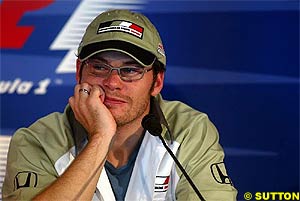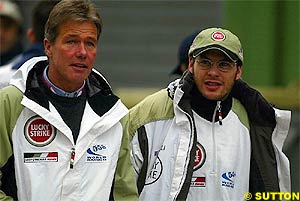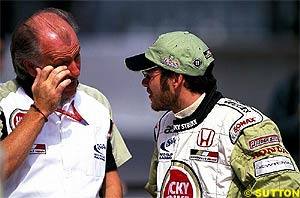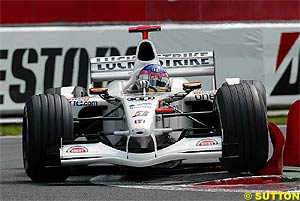
Atlas F1 Senior Writer
Jacques Villeneuve faces 2003, his fifth and probably final season with the BAR team, with increased pressure, his current contract running out at the end of the season. Now 32, the former World Champion can't afford to endure another season in the doldrums if he wants to get a chance of getting back to winning ways. Atlas F1's Thomas O'Keefe explains why he thinks the Canadian will again show his true worth
And, of course, Jacques did something his father never even attempted (although Jacques' uncle, also named Jacques Villeneuve, made a try at Indy in 1986). Jacques won the 1995 Indy 500 in true Family Villeneuve style, coming back from 24th place and a two lap penalty imposed on lap 39 when the 24 year-old inadvertently passed the pace car under a yellow, to win by 2 seconds. His car number was "27", the same as his father's Ferrari and the car and Jacques' helmet are on display at the Hall of Fame Museum on the grounds of the Speedway.
If Villeneuve's manager Craig Pollock has his way, a year from now Jacques will finally come full circle and join the Ferrari team his father Gilles Villeneuve epitomized during his time in Formula One, probably asking permission of the FIA for a dispensation to run No. 27 as his race number. As Pollock was recently quoted in the Journal de Montreal: "this will be his last year with BAR. We intend to honour our contract. A lot of money is at stake....After this last season with BAR, our first choice for 2004 is ...Ferrari...even with Schumacher....At the beginning of Jacques' career, Ferrari would have been a dangerous choice because if [the Ferrari team] hadn't won, they would have said the son doesn't have the father's talent."
Pollock is not alone in Seeing Red in Villeneuve's future. For Bernie Ecclestone, Jacques at Ferrari would create the kind of fireworks that would spice up the show, the current preoccupation of everyone in authority in Formula One. Says Bernie in the November/December 2002 issue of Formula 1 Magazine: "I reckon that Villeneuve is as good as anyone, probably including Michael....If you said to me, 'it's a perfect world, who would you like to have in your car?' I'd say, put Montoya or Villeneuve in a Ferrari alongside Michael, and take away team orders."
Amazingly, having grown up before our eyes, Jacques is now 31 years old, and while his father was at that age struggling with his teammate, Didier Pironi, for supremacy with the Ferrari team, his son Jacques finds himself at odds with his entire team, and not for reasons of his own making, as was also true with his father.
Towards the end of the race, Pironi passed Villeneuve contrary to team orders and "stole" a victory Gilles thought was his. The sour faces on the podium told the whole story. Loyalty was everything to Gilles, whose nobility was as legendary as his swashbuckling driving style. The war of words turned deadly by the next race, the Belgium Grand Prix, when Villeneuve had his fatal accident while trying to beat Pironi's qualifying time.
In Jacques' case, the controversy brewing within the BAR team is also not of his own making and one character trait he and his father both share - loyalty - is being sorely tested. Jacques got involved in the BAR venture in 1997 because of loyalty to his friend and manager, Scotsman Craig Pollock, who Jacques first came to know when Pollock was a ski instructor at a Swiss school Jacques attended when he was a teenager. Between Pollock's business sense and Jacques' driving skill, the two had forged by 1991 a fabulously successful motorsports partnership of the kind that Michael Schumacher and his manager Willi Weber have now perfected at Ferrari. Although it is difficult to start a Formula One team from scratch - just ask Alain Prost - the elements of professionalism brought by Pollock/Villeneuve and the financial backing of British American Tobacco gave some basis to hope that the team could make it.
But on December 18, 2001, Jacques learned, as his father had before him at Imola in 1982, that you cannot always assume that other people share your values. Pollock was ousted by the team's Board of Directors on the eve of launching the BAR Honda 004 for the 2002 season, David Richard was appointed as BAR's team principal, and Villeneuve found himself the only element left of the original BAR concept. Brazilian Richard Zonta, his original BAR teammate, was gone and Frenchman Olivier Panis, with whom he has enjoyed good rapport, is headed for Toyota next season. The squeeze play is plainly on: it is noteworthy that BAR is deeper in its pool of young test drivers than any other team with Anthony Davidson, Darren Manning, Patrick Lemarie and Ryo Fukuda waiting in the wings.
What else has changed: the Supertec engine of 1999 has been succeeded by the best those elite, young Japanese engineers at Honda can produce but, frustratingly, the company that has been so successful and committed for nearly 40 years to both Formula One and Indy style car racing, has yet to raise its game to the standards set by Ferrari and BMW, though few doubt that Honda will get it right in time.
Interestingly, though, it is Richards' background as an accountant that has manifest itself most visibly respecting his star driver, Villeneuve. Now 50 years old, before becoming a professional co-driver, his official biography states that David Richards studied for five years as an accountant and applying the green eye shade mind-set to BAR's budget, what apparently stands out like a sore thumb to him is the salary negotiated by Pollock for Villeneuve back in 1999, when a long-term contract was entered into that does not expire until the end of the 2003 season.
Although hard figures are always difficult to obtain in these matters, it is thought that Villeneuve is Formula One's second highest paid driver, making perhaps $18 to $20 million per year, a budget line that the accountant lurking inside David Richards' head would rather see being spent to develop the car. As a standard of comparison, when Richards is weighing the budget for a driver, chassis, engine and other human resources, it was thought that the Prost team spent something on the order of $30 million to lease Ferrari engines in its last year. So, Jacques' salary is not chicken feed.
If Formula One were a normal business, with the kind of support Richards has with his Board of Directors, Richards' makeover of BAR Honda, which began back in December 2001, would have been completed by now, with Villeneuve being cashiered with a golden parachute and a non-competition agreement and Richards replacing him with a less expensive driver while the team rebuilds. But in Formula One it isn't that simple and it appears that Villeneuve has every intention of honoring the fifth year of his contract and holding BAR to its obligations, the first four years of which Jacques has honored under dismal conditions.
While leaks in the press indicate that massive financial or other inducements to leave BAR-Honda or take a Mika Hakkinen-like sabbatical and come back when BAR is competitive have been waved in Villeneuve's face, at this stage in his career, Jacques Villeneuve isn't budging unless he receives a better offer. Given the frame of reference of a Grand Prix Champion, a better offer can come only from one of the three top teams: Ferrari, where his father remains a legend but where the Schumacher legend is in full sway; Williams, where Villeneuve was already a World Champion but where the current driver duo of Juan Montoya and Ralf Schumacher is possibly the strongest on the grid and McLaren, with whom he has never been on warm terms. According to Bernie, "Ron [Dennis] wouldn't hire Villeneuve in his team, because he's not the image of McLaren."
This season, under Richards' management, BAR has begun to re-invent itself, hiring the respected Geoff Willis away from BMW-Williams to be the technical director of BAR Honda and oversee the approximately 360 people on the team. And in the latter stages of this season, there have been flashes of a Villeneuve's old panache passing Toyotas and Jordan-Honda's on the straights at Spa, taking fourth place at Silverstone and mixing up all year long in the races-within-the race back in the field, with his future teammate Jenson Button's Renault, with the Saubers and the Jordan-Hondas, down in the second division.
How will the power struggle all come out? Will Honda's engine upgrades come good just in time to save everyone's bacon in 2003, making everyone from the Right Honorable Kenneth Clarke, Q.C. M.P., former Chancellor Exchequer for all of England and Chairman of the Board, to Richards, to Willis on down look like geniuses? Will Villeneuve be forced out against his will or will something fall into his lap for 2003 that none of us anticipate now but that will serve to extricate him from the impossible position he finds himself in?
Is Honda's recently announced decision to rescind its contract one year early with Jordan and to focus only on one team in 2003 - BAR - simply a prelude to Honda formally offering to buy the BAR team and come back into Formula One as a constructor - to go toe-to-toe with Toyota on the grid as well as in the showrooms - something Honda has not done since 1968 notwithstanding its 12 Drivers' and Constructors' Championships as an engine supplier to McLaren and Williams between 1986 and 1991. Or will 2003 be a further descent into Hell for all concerned with finger pointing substituting for accomplishments?
In the end, the power struggle at BAR is the case of the rebel vs. the accountant and in the real world, those who control the purse strings almost always win. But whoever said Formula One is the real world! Richards may have dealt with the likes of Bernie Ecclestone and the Chancellor of the Exchequer and investment bankers, but in Villeneuve he has a wily, intelligent and tough-minded adversary and in a test of wills and nerve, you have to credit the tenacity and skill Jacques brings to the table: it is Jacques who has come back from 2 laps down to win the Indy 500, who put his car on pole in his first Grand Prix, who won the 1997 World Championship by brushing sidepods with the best of them, Michael Schumacher, and who had the courage to challenge Eau Rouge flat out in the days before traction control. You would not want to bet against a man like that. Stay tuned for the next Strike, Lucky or not.
He lost his famous father in a horrible accident on a racetrack in Zolder, Belgium in 1982, when Gilles Villeneuve, then 32-years old, came over the brow of a hill at qualifying speed in his Ferrari 126C and crashed into the March 821 of Jochen Mass, then going slowly on a cool-down lap.
 Jacques Villeneuve had just turned 11 years old when his father was killed and could not possibly have known then that he would follow in his father's footsteps so completely, driving with the same flair and commitment and actually exceeding the accomplishments of his father in Formula One. Gilles had six wins, two poles and eight fastest laps in his career; Jacques, even with all the disappointments with the British American Racing (BAR) team of the last few years, has a World Drivers' Championship, 11 wins, 13 poles and nine fastest laps.
Jacques Villeneuve had just turned 11 years old when his father was killed and could not possibly have known then that he would follow in his father's footsteps so completely, driving with the same flair and commitment and actually exceeding the accomplishments of his father in Formula One. Gilles had six wins, two poles and eight fastest laps in his career; Jacques, even with all the disappointments with the British American Racing (BAR) team of the last few years, has a World Drivers' Championship, 11 wins, 13 poles and nine fastest laps.
 In his father's case, the war of words between Didier Pironi and Gilles Villeneuve began 20 summers ago in Imola, Italy in the closing laps of the 1982 Grand Prix of San Marino. Because the Imola race had been boycotted by most of the principally British non-turbo constructors for political reasons, the entire race became a kind of staged affair for the Italian race fans between the Renault turbos and the Ferrari turbos, with backmarkers filling out the field and the turbo drivers passing and re-passing one another to artificially enliven the race.
In his father's case, the war of words between Didier Pironi and Gilles Villeneuve began 20 summers ago in Imola, Italy in the closing laps of the 1982 Grand Prix of San Marino. Because the Imola race had been boycotted by most of the principally British non-turbo constructors for political reasons, the entire race became a kind of staged affair for the Italian race fans between the Renault turbos and the Ferrari turbos, with backmarkers filling out the field and the turbo drivers passing and re-passing one another to artificially enliven the race.
 David Richards was a logical choice to shake up the BAR team as a thoroughbred mover and shaker in Formula One and in the World Rally Cars, a team manager of the Prodrive company, successful in both sports car, touring car and rally racing and, briefly, at team principal at Benetton when Flavio Briatore was out and Richards was in for a time. Richards has also acquired ISC, the company that owns the TV broadcasting rights for the World Rally Cars, from Bernie Ecclestone, so he knows a thing or two about business and racing.
David Richards was a logical choice to shake up the BAR team as a thoroughbred mover and shaker in Formula One and in the World Rally Cars, a team manager of the Prodrive company, successful in both sports car, touring car and rally racing and, briefly, at team principal at Benetton when Flavio Briatore was out and Richards was in for a time. Richards has also acquired ISC, the company that owns the TV broadcasting rights for the World Rally Cars, from Bernie Ecclestone, so he knows a thing or two about business and racing.
 Olivier Panis has also been looking good, finishing 6th in the gruelling Monza race and fifth behind Villeneuve at Silverstone, but being undermined all season long by mechanical failures not of his making. Coming to Indiana, where Pollock used to live, and to the Indianapolis Motor Speedway, where so much went right so long ago for Jacques Villeneuve, must have been especially poignant for this dynamic duo and Jacques' sixth place finish at the 2002 USGP was certainly evidence that the boy racer and his Honda are gradually getting back into the game.
Olivier Panis has also been looking good, finishing 6th in the gruelling Monza race and fifth behind Villeneuve at Silverstone, but being undermined all season long by mechanical failures not of his making. Coming to Indiana, where Pollock used to live, and to the Indianapolis Motor Speedway, where so much went right so long ago for Jacques Villeneuve, must have been especially poignant for this dynamic duo and Jacques' sixth place finish at the 2002 USGP was certainly evidence that the boy racer and his Honda are gradually getting back into the game.
Please Contact Us for permission to republish this or any other material from Atlas F1.
|
Volume 8, Issue 50
Articles
Running on Empty
In a League of His Own
Columns
Off-Season Strokes
The Arrows GP Quiz
Elsewhere in Racing
The Grapevine
> Homepage |